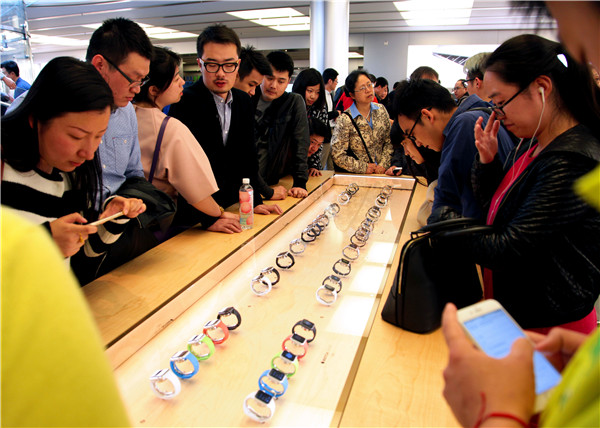 |
|
Consumers look at Apple watches in an Apple store in Shanghai. Apple Inc invested $1 billion in China's largest ride-hailing firm Didi Chuxing last week.QIU DAOCEN/CHINA DAILY |
Actions, they say, speak louder than words; and big-ticket investments, I'd argue, give the lie to views and rhetoric.
Apple's vote of confidence in Chinese innovation and future business prospects, by way of a $1-billion investment in ride-hailing firm Didi Chuxing last Friday, appears to have discounted recent negative Western discourse on China.
It also shows the post-Jobs, Cook-led Apple, the world's biggest brand, is feeling the need to reinvent itself for a future that will likely be marked by convergence of telecommunications, transport, e-commerce, data and content.
From Apple's perspective, the $1-billion investment in Didi is not big. It reportedly has $233 billion in cash and marketable securities. The Didi deal, therefore, appears to be a new beginning, a calculated diversification, if you will, given its own plans for an Apple car and Apple Pay, a mobile wallet/payment system.
Although a newswire report suggested that the Didi deal came about in just 22 days, it is reasonable to assume that much thought and research must have preceded Apple's investment decision. Apple must have weighed many options before deciding to back a Chinese company rather than, say, an Indian, Japanese, Australian or Israeli company. That says something about China and Chinese companies.
Apple's investment in a company that is already backed by Chinese digital behemoths, such as Tencent Group and Alibaba Group Holding Ltd, signals the coming together of massive forces, analogous to a Hollywood multi-starrer.
If time shows that the American Apple and the Chinese "Orange"-a translation of Didi's legal name Xiaoju Kuaizhi-make for a delicious, profitable punch, what could it signify?
More than anything else, it would suggest Apple was right in seeing much value in an innovation-obsessed country when some chose to portray the land as one given to unfair practices and doomed to economic gloom.
Clearly, global businesses and investors are not buying into the pessimism and negativity of some Western politicians and media toward China.
The last millennium's wisdom was that economic concerns are paramount, and will eventually override political differences. Back then, they would say, "It's the economy, stupid."
This millennium's nous, the Apple-Didi deal appears to indicate, is that technology, and the businesses' need to control its rapid, unpredictable evolution and dominate its commercial applications, will overlook leader-manufactured negative mood on political matters and media's slanted analyses.
This is the age of Wi-Fi, social media, endless digital chatter and practical decisions. Everyone with broadband access appears to know which side of the smartphone, err, their bread is buttered.
I'm inclined to believe Apple's $1-billion investment is just the beginning of a trend. Its CEO Tim Cook reportedly remarked during his Beijing visit on Monday that Apple would extend marketing help to developed-in-China mobile apps in order to help the latter go global. I wouldn't be surprised if Apple alone lines up many more billions for investing in various Chinese tech startups down the line. That would open the floodgates.
In the digital age, if economically aware citizens and citizen-friendly businesses find themselves on the same side of an issue, could leaders and governments afford to stay on the other side for long?
It's a question that pops up from the larger scenario surrounding the Apple-Didi deal. And all of us, I suspect, know the answer to that question, whether or not we acknowledge it at a conscious level.
Contact the writer at siva@chinadaily.com.cn
